| Srl | Item |
| 1 |
ID:
120176
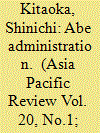

|
|
|
|
|
| Publication |
2013.
|
| Summary/Abstract |
The second Abe administration, inaugurated on December 26, 2012, has been called a repudiation of the Democratic Party of Japan (DPJ) rather than a strong endorsement of the Liberal Democratic Party (LDP). However, in the intervening months, public support has risen. Going forward, the Abe administration faces three serious challenges, namely the economy, security and foreign policy, and a strategy to win in the Upper House elections expected in July 2013. This article analyzes each of these challenges and explores possible courses that the administration could take.
|
|
|
|
|
|
|
|
|
|
|
|
|
|
|
|
| 2 |
ID:
112622
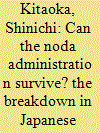

|
|
|
| 3 |
ID:
142981
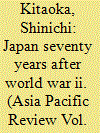

|
|
|
|
|
| Summary/Abstract |
In advance of Prime Minister Shinzo Abe's Statement marking the 70th anniversary of the end of the war, the “Advisory Panel on the History of the 20th Century and on Japan's Role and the World Order in the 21st Century” issued its report. The author served as acting chair of the panel which reviewed the history of Japan and the world from the 19th century to World War II through the 70 postwar years. This article looks at Japan's expansionism in the 1930s, wartime conduct, colonial rule, and the end of World War II. As a previous challenger to world order, Japan seeks to share the lessons learned now as a supporter of the international order. This article elucidates ways in which Japan can cooperate with the international community to promote prosperity and peace around the globe.
|
|
|
|
|
|
|
|
|
|
|
|
|
|
|
|
| 4 |
ID:
096829
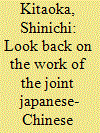

|
|
|
| 5 |
ID:
110896
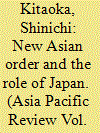

|
|
|
|
|
| Publication |
2011.
|
| Summary/Abstract |
China is changing the international order in East Asia. It is not only a matter of a power transition, but also a matter of a change in the international system. Chinese people tend to see the world order in hierarchical terms as they did for centuries; nationalism is used as a tool of national integration; and government control of the military is weakening. These are the factors behind the rise of China. If these trends continue, a hierarchical order with China as hegemon might be established in East Asia. It seems as if we are returning to the period before the nineteenth century when China led the world. However, the international order in the twenty-first century has to be based upon such principles as the rule of law, peaceful solution of conflict, democracy, and human rights. In order to establish such an order, Japan and other countries that have committed to those values should unite firmly. China also would benefit very much from that order in the long run.
|
|
|
|
|
|
|
|
|
|
|
|
|
|
|
|
| 6 |
ID:
128255
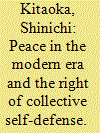

|
|
|
|
|
| Publication |
2013.
|
| Summary/Abstract |
The argument for constitutional revision has been ongoing in the post-war era but until now no action has been taken. The focal point in the discussion has been Article 9. This article argues that Japan's peace posture has not been guaranteed by Article 9. The article then turns to the right of collective defense and whether reinterpretation of Article 9 language is required in the current security environment. The conclusion calls for active and specific dialogue to resolve this issue in a timely manner.
|
|
|
|
|
|
|
|
|
|
|
|
|
|
|
|
| 7 |
ID:
135931
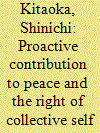

|
|
|
|
|
| Summary/Abstract |
Since the inauguration of the second Abe cabinet in December 2012, there have been many important developments in the area of security policy. This article examines each new policy and how it fits in to the National Security Strategy principles of a “proactive contribution to peace” and international cooperation. It concludes with a comparison of the new policies with those of other major world powers and a discussion of the main source of opposition to Japan's security policy.
|
|
|
|
|
|
|
|
|
|
|
|
|
|
|
|
| 8 |
ID:
099713
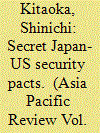

|
|
|
|
|
| Publication |
2010.
|
| Summary/Abstract |
For many years the Japan-US Security Treaty has been the cornerstone of Japanese foreign policy and security policy. Suspicions have long been voiced, however, that behind the security treaty there lurked unpublicized secret pacts. In particular, despite the denials of the Japanese government, there were suspicions that nuclear-armed warships had in fact called at Japanese ports. With the change in government in September 2009, the issue came to be the subject of an investigation by the new Democratic Party of Japan administration. The author of this article served as chairman of the commission of inquiry.
|
|
|
|
|
|
|
|
|
|
|
|
|
|
|
|
| 9 |
ID:
160961
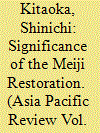

|
|
|
|
|
| Summary/Abstract |
The year 2018 marks the end of the 260-year rule by the Tokugawa Shogunate and the start of a new government headed by the Emperor. The term “Meiji Restoration” is often used narrowly to refer to the political events of 1868, which is why the 150th anniversary is observed this year. More generally, however, the term often refers to the series of changes that occurred after the new government was established, including Japan’s opening to the world, abolition of feudal domains and the samurai class, establishment of the modern Cabinet system in 1885, and proclamation of the Meiji Constitution in 1889 and the opening of the Parliament in 1890. In this article, the author uses the term in this broader sense.
|
|
|
|
|
|
|
|
|
|
|
|
|
|
|
|
| 10 |
ID:
146409
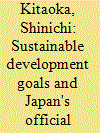

|
|
|
|
|
| Summary/Abstract |
Substantial progress toward achieving the Millennium Development Goals (MDGs) was made, but unsolved issues remain. The Sustainable Development Goals (SDGs) succeeded the MDGs in 2015. In Japan the concept of “Human Security” has been incorporated into its foreign policy since the 1990s and is explicitly stated as the basic concept of Japan's Development Cooperation Charter issued in 2015. Also included in the Charter is Japan's “Proactive Contribution to Peace” policy and national interest, both of which are closely related to the concept of Human Security.
|
|
|
|
|
|
|
|
|
|
|
|
|
|
|
|
| 11 |
ID:
155387
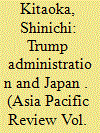

|
|
|
|
|
| Summary/Abstract |
It is possible that Donald Trump’s success in the US presidential election of November 2016 will touch off the greatest transformation in world politics since World War Two. This is because, for the first time, the presidency of the United States—a country that since World War Two has consistently upheld the liberal world order—has been won by a man who asserts that the US national interests will take precedence over international cooperation.
|
|
|
|
|
|
|
|
|
|
|
|
|
|
|
|